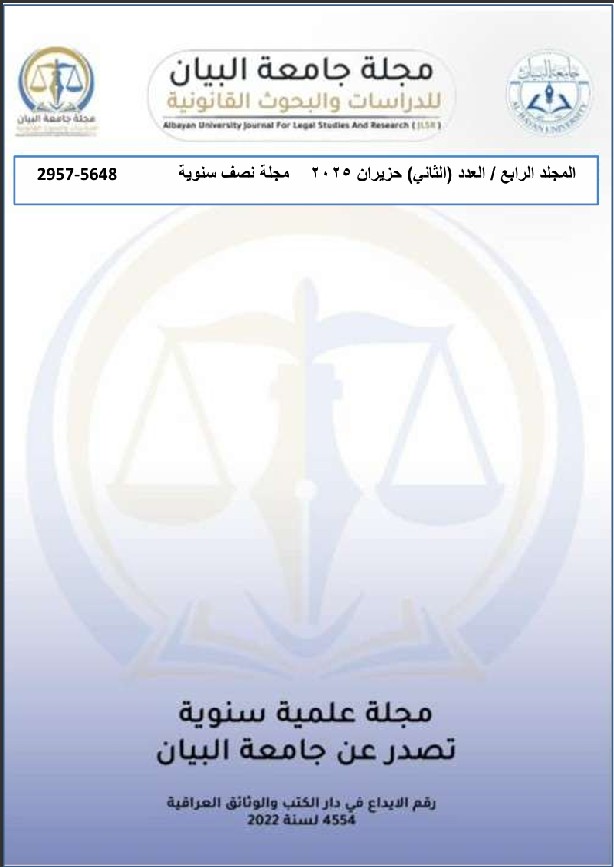تأثير صمت المتهم على حقه في الدعوى الجزائية
DOI:
https://doi.org/10.65263/aujlsr.V4.I2.Y2025.P85-107.102الكلمات المفتاحية:
المتهم، حق المتهم بالصمت, صمت المتهم, تأثير صمت المتهم, صمت المتهم في الدعوى الجزائية.الملخص
المراجع
First: Books and theses:
1. Ibn Manzur, Lisan al-Arab, Volume 12, Dar Beirut, Beirut, 1956.
2. Tawfiq Muhammad al-Shawi, Invalidity of the Preliminary Investigation Due to Torture and Coercion of the Accused, Dar al-Isra, Amman, 1998.
3. Jamal Girgis Majla', The Constitutional Legitimacy of Judicial Police Actions, Golden Eagle, Cairo, 2006.
4. Hassan Youssef, Legitimacy in Criminal Procedures, Dar al-Thaqafa, Amman, 1st ed., 2003.
5. Ramsis, Judicial Psychology, Mansha'at al-Ma'arif, Alexandria, 1979.
6. Sami al-Nasrawi, A Study in the Principles of Criminal Trials, Vol. 1, Vol. 2, Dar al-Salam Press, Baghdad, 1976.
7. Abdul Hamid al-Shawarbi, Guarantees of the Accused during the Criminal Investigation Stage, Mansha'at al-Ma'arif, Alexandria, 1988.
8. Abdul Hamid Abdul Hadi al-Sa'dun, Interrogation of the Accused, PhD thesis submitted to the College of Law, University of Baghdad, 1992.
9. Ali Zaki al-Arabi Pasha, The Basic Principles of Criminal Investigations and Procedures, Vol. 1, Press of the Committee for Authorship, Translation, and Publication, Cairo, 1940.
10. Fahmi Mahmoud Shukri, The Encyclopedia of the British Judiciary, Dar al-Thaqafa, Amman, 1st ed., 2004.
11. Mamoun Muhammad Salama, Criminal Procedures in Egyptian Legislation, Vol. 2, Dar al-Fikr al-Arabi, Cairo, 1979.
12. Muhammad Ibrahim al-Kuwaifi, The Syrian Code of Criminal Procedure, Dar al-Milah, Damascus, Cairo, 2001.
13. Muhammad al-Sa'id Abd al-Fattah, The Effect of Coercion on the Will in Criminal Matters, Dar al-Nahda al-Arabiyya, Cairo, 2002.
14. Muhammad Sa'id Nammour, The Principles of Criminal Procedure, Dar al-Thaqafa, Amman, 1st ed., 2004.
15. Mahmoud Najib Hosni, Explanation of the Code of Criminal Procedure, Dar al-Nahda al-Arabiyya, Cairo, 1982.
Second: Research published in judicial journals and collections
1. Ibrahim Al-Mashahdi, Legal Principles in the Judiciary of the Court of Cassation, Criminal Section, Al-Jahiz Press, Baghdad, 1990.
2. Muhammad Muhyiddin Awad, Fair Criminal Trials and Human Rights, a research published in the Arab Journal of Security Studies, published by the Arab Center for Security Studies, Riyadh, Special Volume, Issue 9.
3. Dr. Marouk Nasreddin, Stages of Evidence Collection in the Code of Criminal Procedure, a research published in the Arab Journal of Jurisprudence and Judiciary, General Secretariat of the League of Arab States, Issue 32, 2005.
4. Judicial Bulletin, Issue 3, Year 5.
5. Al-Waqa'i' Al-Iraqiya Newspaper, Issue 3978, August 17, 2003.
Third: Laws
1. The Egyptian Penal Code of 1937
2. The Universal Declaration of Human Rights of 1948
3. The Syrian Penal Code of 1949
4. The Egyptian Code of Criminal Procedure of 1950
5. The Syrian Code of Criminal Procedure of 1950
6. The Jordanian Penal Code of 1960
7. The Jordanian Code of Criminal Procedure of 1961
8. The International Covenant on Civil and Political Rights of 1966
9. The Iraqi Penal Code of 1969
10. The Iraqi Constitution of 1970
11. The Egyptian Constitution of 1971
12. The Iraqi Code of Criminal Procedure of 1971
13. The Syrian Constitution of 1973
14. The Sudanese Code of Criminal Procedure of 1991
15. The Yemeni Code of Criminal Procedure of 1994
16. The Palestinian Code of Criminal Procedure of 2001
17. Constitution of the Kingdom of Bahrain of 2002
18. Iraqi Constitution of 2005
19. Yemeni Constitution
20. Omani Code of Criminal Procedure
Fourth: Foreign Sources and Websites:
1) peter Marphyha, Criminal Practice, Bpc wheat ons limited ,1995
2) http://www.citizen sinformation –
3) http: //www.re
التنزيلات
منشور
إصدار
القسم
الرخصة
يحتفظ المؤلفون بحقوق الطبع والنشر الكاملة لمقالهم المنشور.
تُطبّق مجلة جامعة البيان للدراسات والبحوث القانونية (AUJLSR) رخصة المشاع الإبداعي المنسوبة 4.0 الدولية (CC BY 4.0) على مقالاتنا وأعمالنا الأخرى. إذا أرسلتَ بحثك للنشر من قِبل AUJLSR، فإنك تُوافق على تطبيق رخصة CC BY 4.0 على عملك.
يمكن قراءة المقالات ومشاركتها وفقًا للشروط التالية:
النسبة: يجب أن تُنسب إلى المصدر الأصلي (Attribution).
التفاصيل الكاملة متوفرة على الرابط:
https://creativecommons.org/licenses/by/4.0/



